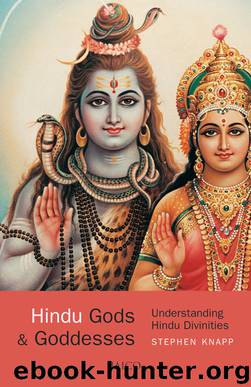Hindu Gods & Goddesses by Stephen Knapp

Author:Stephen Knapp [Knapp, Stephen]
Language: eng
Format: epub, azw3
ISBN: 9788184953664
Publisher: Jaico Publishing House
Published: 2013-02-03T23:00:00+00:00
HOW LORD SHIVA APPEARED IN THIS WORLD
The previous paragraphs point out how Lord Shiva participated in the creation process from Maha-Vishnu as Shambhu. But it is also related how Lord Shiva appeared in this universe in his personal form from Lord Brahma. It is explained in the Bhagavatam (3.12.4), that in the beginning of the creation process, Lord Brahma manifested four great sages named Sanaka, Sananda, Sanatana, and Sanat-kumara. Brahma expected them to assist in filling the universe with varieties of living beings. However, they were unwilling to adopt materialistic activities because they were highly elevated beings. Brahma requested that they begin to produce progeny, but they refused because they were already attached to Lord Vasudeva, the Supreme Lord, and were focused on achieving liberation, moksha. So, they expressed their unwillingness, which made Lord Brahma extremely angry.
The anger that was generated in the mind of Lord Brahma, though he tried to control it, came out from between his eyebrows. Immediately there was produced a child of mixed red and blue color. This child immediately began to cry and requested to Lord Brahma, "O destiny maker, teacher of the universe, kindly designate my name and place." Lord Brahma then pacified the boy and said, "O chief of the demigods, you shall be called Rudra because you have cried so anxiously." Then Brahma gave Rudra the following places for his residence: the heart, the senses, the life-air of the body, the sky, the air, the fire, water, earth, sun, the moon, and austerity. He then told Rudra that he would be known by eleven other names: Manyu, Manu, Mahan, Shiva, Ritadhvaja, Ugrareta, Bhava, Kala, Vamadeva, and Dhritavrata. These names represent the other aspects of Lord Shiva, each having different appearances and activities. Rudra is often shown as tall, well built, with long hair, wielding the thunderbolt, bow and arrow. He is viewed as the protector of humanity against its enemies. He is also known as an excellent physician and has numerous medicines that can cure diseases. Brahma also told Rudra that he would have eleven wives, namely Dhi, Dhriti, Rasala, Uma, Niyut, Sarpi, Ila, Ambika, Iravati, Svadha, and Diksha.
Brahma then told Rudra to accept these names and wives, and that since he was one of the masters of the living beings, he should now increase the population on a large scale. Rudra then created many offspring that resembled him in color, strength and furious nature. They were unlimited in number, and when they gathered together, they attempted to devour the universe. Brahma, becoming alarmed at the situation, then requested Rudra not to generate living beings of this nature. It would be better if Rudra engaged himself in penance, or meditation, which is auspicious for all. Through penance he could create the universe as it was before. By penance only can one approach the Supreme Lord, who is within the heart of every living being and at the same time beyond the reach of the senses. Thus, Rudra accepted the advice of his father, Brahma, and went to the forest to perform austere penances.
Download
This site does not store any files on its server. We only index and link to content provided by other sites. Please contact the content providers to delete copyright contents if any and email us, we'll remove relevant links or contents immediately.
Fingersmith by Sarah Waters(2524)
Kundalini by Gopi Krishna(2171)
Wheels of Life by Anodea Judith(2130)
Indian Mythology by Devdutt Pattanaik(1928)
The Bhagavad Gita by Bibek Debroy(1915)
The Yoga of Jesus: Understanding the Hidden Teachings of the Gospels by Paramahansa Yogananda(1844)
Autobiography of a Yogi (Complete Edition) by Yogananda Paramahansa(1805)
The Man from the Egg by Sudha Murty(1799)
The Book of Secrets: 112 Meditations to Discover the Mystery Within by Osho(1656)
Chakra Mantra Magick by Kadmon Baal(1635)
The Sparsholt Affair by Alan Hollinghurst(1578)
Gandhi by Ramachandra Guha(1521)
Sparks of Divinity by B. K. S. Iyengar(1516)
Avatar of Night by Tal Brooke(1511)
Karma-Yoga and Bhakti-Yoga by Swami Vivekananda(1486)
The Bhagavad Gita (Classics of Indian Spirituality) by Eknath Easwaran(1472)
The Spiritual Teaching of Ramana Maharshi by Ramana Maharshi(1422)
Hindoo Holiday by J. R. Ackerley(1369)
Hinduism: A Very Short Introduction (Very Short Introductions) by Knott Kim(1363)
